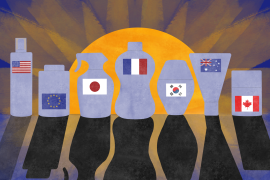WHO TB Drug-Purchasing Plan Could Serve as Model for Global AIDS Fund
The World Health Organization's new program for purchasing tuberculosis drugs in bulk, which has lowered TB drug prices and increased drug access, could serve as a "model" for the purchase of anti-AIDS drugs for Africa and the developing world, the New York Times reports. The WHO program, which began in March with a $10 million grant from the Canadian government, has utilized "competitive bidding" to lower the price of a six-month TB treatment course from between $15 and $20 to about $10, fund manager Dr. Ian Smith said. The TB drugs are supplied by MEG/Svizera, a generic drug manufacturer with offices in the Netherlands and India. Dr. David Heymann, WHO's executive director in charge of communicable diseases, said the plan will "serve as an example" for the Global AIDS and Health Fund proposed by the United Nations. However, the Times notes that the use of generic AIDS drugs may draw protest from pharmaceutical companies that want to ensure that their patents are respected. Unlike many TB drugs, most anti-AIDS drugs are relatively new and are still protected from generic competition in most countries. Heymann said he was unsure whether generic manufacturers would be permitted to offer bids to provide the anti-AIDS drugs, but WHO has stated that it supports the manufacture of generic drugs as long as the quality of the medications is "ensured" and their use "does not violate patent laws." Officials will determine exactly how the drug-purchasing arm of the global AIDS fund will operate later this summer. Mark Grayson, a spokesperson for the Pharmaceutical Research and Manufacturers of America, said his organization will "oppose any effort" that includes the use of generic drugs that are patent-protected. "The global fund should abide by intellectual property laws," he said, adding that the patent-holding drug manufacturers already offered "steep" discounts in the developing world. Smith noted that the TB fund does not use the competitive bidding process to purchase any of the newer patent-protected TB drugs. Participant countries in the TB program "must agree to abide by detailed treatment rules" meant to ensure that patients abide by drug regimens in order to decrease the risk of developing drug-resistant strains. Smith added that such a system could also be applicable to AIDS treatment (Petersen, New York Times, 6/22).
This is part of the Morning Briefing, a summary of health policy coverage from major news organizations. Sign up for an email subscription.





